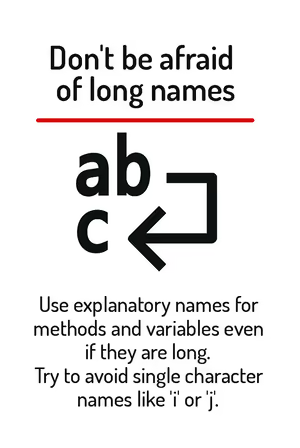Don’t be afraid of long names

Good names are the easiest way to make code self-explanatory. A long, descriptive name saves more time than a short one that forces readers to guess what it does. Names are not just labels - they are documentation you can’t get out of sync with the code.
For example, instead of this confusing snippet:
int d; // days?
int t; // total?
int p; // price?Use clear names that tell the story:
int daysUntilExpiration;
int totalInvoiceAmount;
int productPriceInCents;Same goes for methods. A short, “clever” name might save a few keystrokes but costs understanding:
double calc(int a, int b) { ... } // what does it calculate?Better:
double calculateMonthlyInterest(int principalAmount, int numberOfMonths) { ... }Long names are fine if they remove ambiguity. Use nouns for variables and classes, verbs for methods, and prefer clarity over brevity. Single-character names are only acceptable in very small scopes, like loop counters in tiny loops:
for (int i = 0; i < items.size(); i++) { ... }When committing code, always ask: “If I came back in six months, or a new developer joined, would they understand what this is doing without comments?” If the answer is no, rename it.
Clear names prevent bugs, reduce the need for comments, and make refactoring safer. Don’t fear typing an extra few characters - future readers, including future you, will thank you.